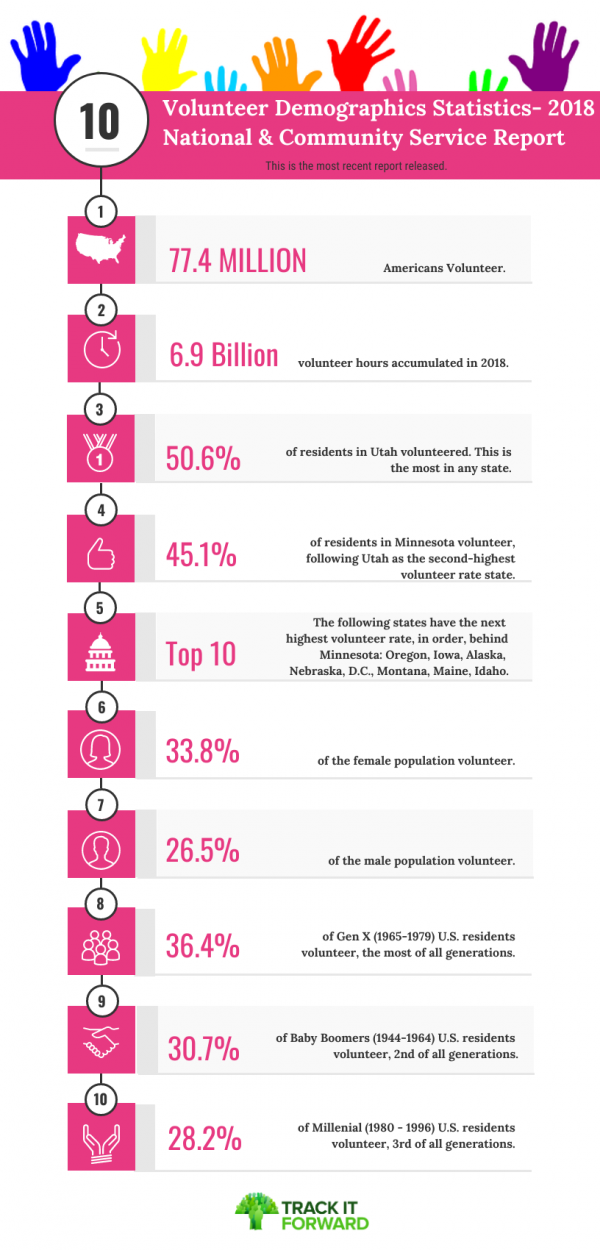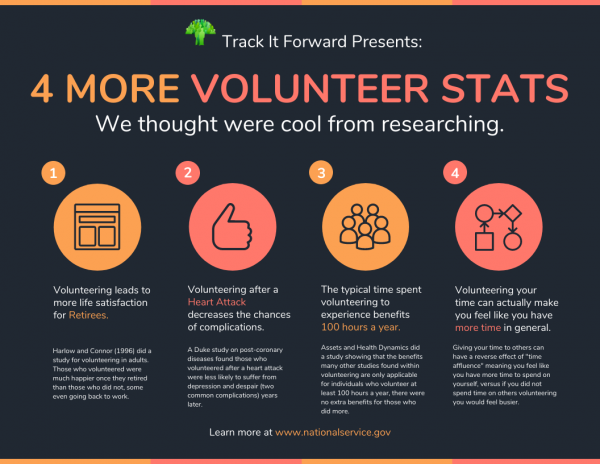Whether you are looking for volunteer statistics to help promote your program, sell an idea for your organization, or just to influence people to volunteer with you - we are here to help you and your volunteer program out with some statistics!
Volunteering is something that people cannot really say anything bad about. It is the act of people giving up their time, for free, to help organizations, whose sole mission is to help solve a problem or promote goodness in the community. So, there is no controversy when it comes to the topic of volunteering being beneficial or these volunteer stats. There are so many studies showing just how beneficial volunteering is, beyond the superficial points. These volunteer statistics are great to make you feel even better about volunteering or to use to motivate your volunteers!
But first, let’s get some general volunteer statistics out in the open, just so you have an idea of how many different volunteers there are, in America alone!

Interesting Volunteer Stats and Metrics
Volunteer statistics range from what volunteering can do for participants internally, how volunteering can help them long-term, and even how they can live longer if you volunteer! Check out these volunteer stats that will help you convince others that volunteering is the way to spend their free time!
Volunteer Stat #1: Volunteering connects you with your community, which can lower the mortality rate by 2.7%
For those of us who volunteer solely to help, you’ve got great news - you have a better chance of living longer! This volunteer statistic is for you. Not all volunteering is completely selfless, some of us just like the feeling we get from volunteering, and that is okay! To do something to make yourself feel better is a form of self-care, and if that is volunteering- so be it!
Volunteer Statistic: According to a Health Psychology Journal study, those who volunteered in order to be oriented with the community and non-self-serving purposes were at a lower risk for mortality only 1.6%, up to four years later!
Volunteer Stat #2: Volunteering helps physical health- including decreasing the likelihood of high blood pressure development by 40%
This volunteer statistic actually applies whether volunteers are doing manual labor at a volunteer shift, or not! Of course, the physical act of volunteering can be an exercise in itself. But, even for those of us who aren’t heavy lifting or helping run marathons when we volunteer, we are still in luck to be healthier when it comes to heart health according to these volunteer statistics.
Volunteer Statistic A: Participants in this study had their blood pressure tested before a year of volunteering, after one year, and after four years. Those who volunteered an average of 200 hours a year, 3-4 hours a week, were 40% less likely to develop high blood pressure, even four years later!
Volunteer Statistic B: From the Social Science and Medicine Journal, a study showcased people who volunteered were 47% more likely to get cholesterol checks and 30% more likely to get flu shots in comparison to those who did not volunteer!
Volunteer Stat #3: Volunteering can help decrease high-stress levels, anxiety, or depression.
*Volunteering should not be a place you should go to solve any of these issues and is not a replacement for medical help.*
When someone is extremely stressed, the act of volunteering can get them out of their own head for a bit and have you catch up with other people in your community. Volunteering usually brings on a self-reflection element naturally, as you help people you look at how you can be better yourself. This precisely helps support our next volunteering statistics.
Volunteer Statistic A: This study from Baltimore Experience Corporation studied adults over the age of 50 who volunteered in public schools helping youth and adults the same age who did not volunteer. The volunteers were found to take more steps daily (even when they were not volunteering), be less clinically depressed, and have better cognitive skills than those who did not volunteer.
Volunteer Statistic B: Multiple studies have actually showcased this next volunteering stat, including a study of over 2,000 people. People who repetitively have acts of altruism, giving time and goods to strangers and friends, have decreased stress levels and enhanced mental health.

Volunteer Stat #4: Volunteering increases self-confidence and self-esteem by 6%
This statistic is a great reason why younger people should volunteer more. Self-confidence and self-esteem are two extremely important, yet rare qualities to gain as a younger individual. We all have our awkward phases! Volunteering can push people out of their comfort zones and help showcase what they care enough about to become a leader, a vocal volunteer, or an activist! If you are a parent who wants their child to experience more and gain more skills, this volunteer statistic is your sign.
In an article by Stanford, Susan Wedge, a Partner in IBM’s Global Business Services Public Sector, says:
“When you are working with people who speak a different language and live in a different culture than you do, your sensitivity to communication is heightened in new ways,” Susan remarked. “That is a learning experience that you bring back to your own more familiar work environment. It changes you.”
Volunteer Statistic A: A study from The International Journal of Sciences: Basic and Applied Research analyzed active volunteers and people who did not volunteer in a college setting. They gathered the mean results analyzing how much family, educational, social, and general self-esteem each group had. The non-volunteers were at a .59-.7 on the scale while the volunteers were at a .69-.76, meaning they were much higher!
Volunteer Statistic B: A study from the Journal of Adolescence states that volunteering in large or small acts can raise teens’ feelings of self-worth. Then, a study showcased how self-worth directly links to higher self-esteem in older individuals. So, volunteering boosts self-worth, which boosts self-esteem as a long-lasting characteristic.
Volunteer Stat #5: 96% of volunteers claim they feel a sense of purpose, therefore happier and healthier!
Having a sense of purpose is something that many people struggle with, but it has proven to have many benefits to your mental health and physical well- being! This volunteer statistic only makes sense to help support mental health. Volunteering may provide a feeling like you are doing something good, and that is your purpose, to help do something good. It is a pretty great purpose if you ask us.
Volunteer Statistic A: Project Helping did a study on all of their volunteers. 96% of them said that volunteering enriches their lives and sense of purpose in life.
Volunteer Statistic B: Psychosomatic Medicine did a study in 2016 where the conclusion stated that possessing a defined purpose in life is associated with a reduced risk for early mortality and cardiovascular diseases.
Volunteer Stat #6: Volunteering helps gain reputable skills for a future career and gives a 27% advantage over non-volunteers.
It's no secret, volunteering helps showcase a personal aspect and a kind heart on a resume. It helps build character when applying for a job, but it also helps build skills that individuals may need in any career. Whether it is planning, leadership, communication, or just social skills- mostly anything learned in volunteering can be put into a career. But, 27%! That’s a pretty clear advantage and a good volunteer stat for those looking at using volunteering for a job or college application.
Volunteer Statistic A: The Corporation for National and Community Service did a study on volunteers versus non-volunteers when it comes to a professional standpoint. Two that stood out were:
If laid off, volunteers have a 27% better chance of getting hired than those who do not volunteer.
Those who do not have a high school diploma have a hard time finding employment. Volunteers who do not have one have a 51% better chance of getting one than those who do not volunteer.
Volunteer Statistic B: The Wall Street Journal and Forbes interviewed over 200 human resources executives who help hire employees. The majority of them said that skilled volunteer work makes a potential employee stand out and more likely to be hired.
If these statistics on volunteering don’t sell a volunteering aspect to your community, we don’t know what will!

Track It Forward is a volunteer tracking system that works for all nonprofit organizations or companies looking to track volunteers!
FAQ on Volunteer Stats
1. What percentage of people do volunteer work?
On average, 25% of Americans use their free-time to volunteer.
2. What is the most common type of volunteering?
The most common type of volunteering is fundraising for an event of nonprofit, followed by tutoring!
3. What age group is most likely to volunteer?
While millenials and students are the individuals who require volunteer hours for their current life standard, Generation X, people aged 41-61 make up the age group most likely to volunteer.
 Last updated by
Last updated by